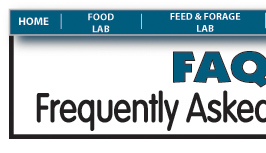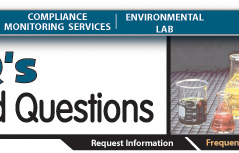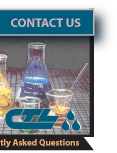| ENVIRONMENTAL
LAB
Is it safe to drink your tap water at home?
If you haven't tested your drinking water and question
if it is safe to drink, contact CTL-Lab by phone (800) 962-5227 or by E-mail.
We will send you a CTL water testing kit along with instructions.
If
I wanted to send you a water sample from my home, how would I send it?
Call CTL at 1-(800)-962-5227 or
E-mail
CTL Lab Service Representative and request a water testing kit.
Please let our Service Representative know if you are sending a sample from
your home, your business, or a state agency. There are different requirements
for each.
I
have a nitrate result greater than 10 ppm (mg/L). Is my water safe to drink? What
can I do to make my water safer to drink as far as nitrates are concerned?
The USEPA and the State of Wisconsin has set a Maximum Contamination
Level (MCL) of 10 ppm (mg/L) nitrate for public drinking water supplies and as
a guide for private water supplies. A MCL is the highest level of a contaminant
that is allowed in drinking water. Nitrates are dangerous especially to infants
under the age of 6 months. Some symptoms include shortness of breath and blue-baby
syndrome. Most adults are not overly affected by nitrates. Water
Care Specialist, Plumbers, and Well Installers are all good sources for treatment
systems for nitrates. There are several systems available to treat water for nitrates,
and these professionals will be able to suggest the best system for your needs.
I
have a white (or some other color) buildup around my sink drain and shower stall.
Is this coming from my water?
What you are most likely seeing is a build-up of hard water scale. Look in
your tea kettle and see if you find the same substance there. Hard water
scale is the result of water precipitating the natural calcium or magnesium compounds
from your water. Water that is hard is not a health threat, it is more an
esthetic issue. Some people prefer the taste of hard water to softer water.
The colors you may be seeing are the iron (reddish) or copper (greenish) also
precipitating out of your water. If you have your water tested for hardness
you can interpret the results as follows:
0 ppm Very Soft
50 ppm Soft
125 ppm Hard
200 White buildup will occur
250 Very Hard
How can I tell if
I have lead in my water?
Your local
public water supply is required to test for lead on a regular basis. You
can call them or ask for the latest issue of their Consumer Confidence Report
(this will list all the constituents the supplier must test for and whether or
not any contaminants were found). If you live in an older house, one which
may have lead pipes or lead based solder call our lab for specific instructions
and special sample bottles to have a sample analyzed.
INTERESTING
FACTS:
- Non-Detects (ND) - laboratory analysis indicates
that the constituent is not found.
- Parts per million (ppm) or Milligrams
per liter (mg/l) - one part per million corresponds to one minute in two
years, or a single penny in $10,000.
- Parts per billion (ppb) or Micrograms
per liter - one part per billion corresponds to one minute in 2,000 years, or
a single penny in $10,000,000.
- Parts per trillion (ppt) or Nanograms
per liter (nanograms/l) - one part per trillion corresponds to one minute in 2,000,000
years, or a single penny in $10,000,000,000.
- Parts per quadrillion
(ppq) or Picograms per liter (picograms/l) - one part per quadrillion corresponds
to one minute in 2,000,000,000 years or one penny in $10,000,000,000,000.
|
|
E.
Coli is generally killed at what temperature?
Always cook meat, especially ground meat, until the juices
run absolutely clear, pink is not good enough. It is generally good for
the internal temperature of a hamburger patty to reach 160 degrees F to kill all
contaminating E.Coli.
What
if I need to send something that needs to remain frozen? How do I send it
to you? How would I pack it?
If you mail anything frozen, it is best
if you pack it in "dry ice" and send it next day service. This
will keep your product frozen.
FACT:
A typical food travels an average of 1,100 miles to reach your
table.
Source: National Food Processors Association.
|
|
Are
your cattle getting all the nutrients they should be?
To be sure your livestock are getting a balanced diet, have
your forages tested for the basic nutrients, and send a sample of your forage
to Commercial Testing Laboratory. Call or E-mail
us for a forage sample bag and mail it to CTL. Bags are self-addressed and
postage paid.
How
long do I have to wait for my test results?
This
depends on the method of testing. The NIR testing is usually same day results,
although not all samples can be run on NIR. The other method of testing
is by Wet Chemistry. This method will take longer because of the drying
process and other testing procedures the Wet Chemistry method entails. Turn
around time for the Wet Chemistry is usually within 3-5 working days.
Do
you monitor your equipment to ensure your customer's results are accurate?
Yes,
our Laboratory Technicians run Quality Control samples on a weekly basis.
The NIR instruments are constantly maintained and on a daily basis check samples
are scanned ensuring our customers receive accurate results. CTL is a member
of the National Forage Testing Association (NFTA). We are also members of
the NIRS Feed and Forage Consortium. See
our certification page. For more
information, please contact our Lab Service Representative by phone 1 (800) 962-
5227 or by E-mail.
|
| What
is your office and laboratory hours?
We are open Monday through Friday, from
8:00 a.m. until 4:30 p.m.
If
I'm unable to read or understand the test results, will you have experienced professionals
at CTL explain to me what the result mean and answer my questions?
Yes. Feel free to call us at 1-(800)-962-5227 or E-mail
our Lab Sales Representative.
WHAT
TYPES OF CLIENTS DO YOU TEST FOR?
Agri-Business, Animal & Pet Food Manf., Biological
Supply Houses, Bottle & Breweries, Confectioners, Canning Companies, Dairy
Industry, Delicatessens, Drying Plants, Fast Food Industry, Food Distributors
& Brokers, Grocery Industry, Fur Farms, Government Agencies & Municipalities,
Health Care Facilities, Heavy & Light Industry, Metal Finishers, Pizza Manf.,
Plastics Industry, Poultry Producers, Public Utilities, Pulp & Paper Manf.,
Realtors, Restaurants, Sausage Makers, Veterinarians, Water Treatment Companies,
Well Drillers, Home Owners, and the list goes on.
What
if I live in another state, not in Wisconsin, and would like something tested.
Would I have to get the sample to your company within so many days? And
how would I send the sample?
This depends on what type of sample you are sending.
Some samples require overnight mailing whereas other samples do not need to be
sent overnight. The best way to find out how to send your sample is to contact
us by phone at 1-(800)-962-5227 or E-mail.
Questions regarding how to send your sample and if there is a time limit in getting
the sample to CTL will be answered by our Service Representative.
When
was your company established and how many employees do you have?
For
our History, visit our History page. We
currently have 39 employees. Our Company's growth has been slow and strong.
We are extremely proud of our employees. Our Laboratory Technicians are
dedicated to their work and to the Company. Over 70% of our full-time employees
have been employed at Commercial Testing Lab for over 8 years. Commercial
Testing Laboratory's philosophy is to recognize our employees, "they are
our Company's foundation" and to give the highest quality customer service
with a personal touch.
Where
are you located?
We are located in Colfax, Wisconsin, population 1,100.
Colfax in the West Central part of Wisconsin, between Menomonie and Eau Claire.
Who
do I contact if I have additional questions?
You can contact our Lab Customer Service Representative
via E-mail,
phone 1-(800)-962-5227, or fax (715) 962-4030. |


